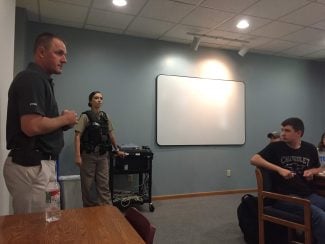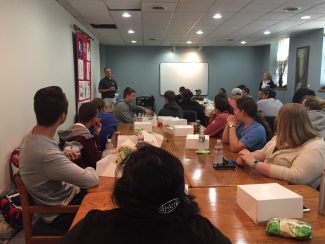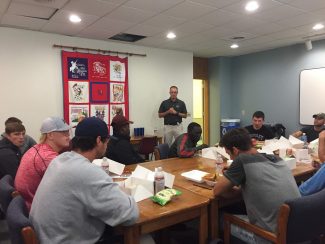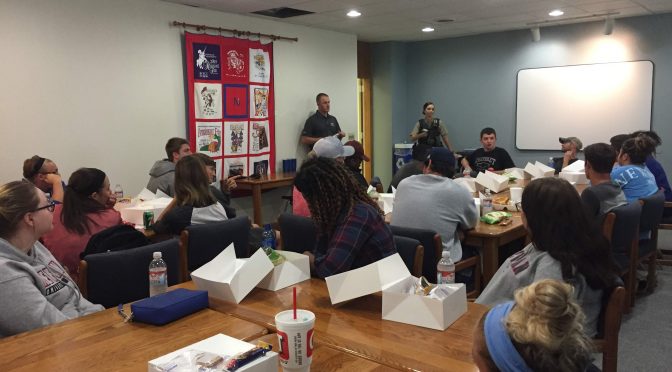Career Services partnered with the criminal justice program to host “Table Talks,” an event during which criminal justice majors could ask questions of alumni who have the same degree and a successful career in the field.
Director of Career Services Melody Head said, “We want to do as many majors as we can. This is the second one, with criminal justice. We did accounting last year — 30 students came, and they loved it.”
Approximately 40 students were in attendance at the October event. Head hopes to do one “Table Talk” per quarter during the 2017-2018 academic year.
Head further explained, “Students gain a lot of perspective because the speakers explain their experience at Newman and provide advice on how to better achieve success in the program.”
Brielle Dunham, alumni relations and annual giving coordinator, added, “Connecting students with alumni shows them that there is a light at the end of the tunnel. There is a life after graduation. For them to see people living a career in their field helps the students see a purpose for the papers and exams.”
This “Table Talk” hosted two alumni speakers: Mike Jausel, who works at the Sedgwick County Sheriff’s Department, and Emily
Jausel graduated from Newman in 2014 and has worked in the sheriff’s office for four years. He interned at the sheriff’s office for two semesters thanks to Professor of Sociology and Assistant Undergraduate Dean Larry Heck.
Currently, Jausel is up for promotion to detective. Jausel specializes in DUI cases. He has worked on the streets for three and a half years.
Stryker started at Newman in August 2013 and graduated in 2015 with a bachelor’s degree in criminal justice. Assistant Professor of Criminal Justice and Director of Paralegal Kristi Edwards helped Stryker get an internship with the WPD. She became a WPD officer in November 2016. Stryker officially started Jan. 9 of this year after spending six months in the academy.
Questions from the students in attendance ranged from how to apply for an internship to how to get into certain areas of law enforcement to what the police academy is like and tips for doing well in the academy.

Jausel responded, “Throw at me what you will, I’m ready for it. I learned how to properly craft a resume — Dr. Heck helped me get an internship with the sheriff’s office — and the critical thinking, report-writing and test-taking all helped me pass the academy, and I still use those skills every day.”
Stryker responded, “I already had notes from here [Newman] that helped me in the academy. You can use what you learned here to help you know more than the basics. My education from Newman gave me a better, bigger foundation. Other students would come to me to study with because I already had the notes and the knowledge.”
The two officers recounted times in the academy, told stories from the beat and gave tips on how to apply for certain positions and which skills acquired at Newman will help students perform better at the academy and achieve career goals and how those skills are paramount to everyday work.
For example, Jausel said the Case Law class helped with report-writing and court cases. While on-the-job training is valuable, Jausel said, it was academics that helped him to learn more quickly on the job.
“You need to use critical thinking since you’re tasked with solving everyone’s problems,” said Jausel.
When asked if she is treated differently as a female police officer, Stryker responded, “I got a lot of support in the academy from my male peers. We’re all family and I’ve never been treated differently. We’re there for each other. And, surprisingly, out on the beat, I get better responses than most of my male counterparts do.”
Jausel seconded her statement by expressing, “If an officer needs help, no matter the department, then we’re always there for each other.”
After the event, senior Rebecca Tyndall said, “Career Services (at Newman) cares about opportunities for many careers. And at this event, not just one avenue of law enforcement was displayed but different types. It gave me a lot more information on how to start the process or what to expect along with what skills I need to develop to be successful in this career. It very much prepared me for my future career.”
The most important takeaway Jausel stressed was 
Stryker echoed a similar sentiment, stating, “Don’t let any setbacks … prevent you from working toward your education. In law enforcement, you don’t have to have a degree but it does benefit you in the long run. It’s going to make the academy easier, it’ll make you a better officer and you’ll more likely be chosen for career promotions, along with all the knowledge gained. Having the degree is the most important part of achieving success in law enforcement.”


